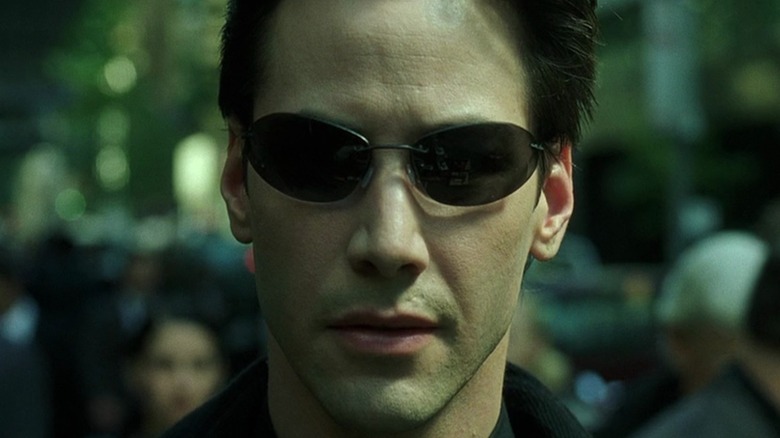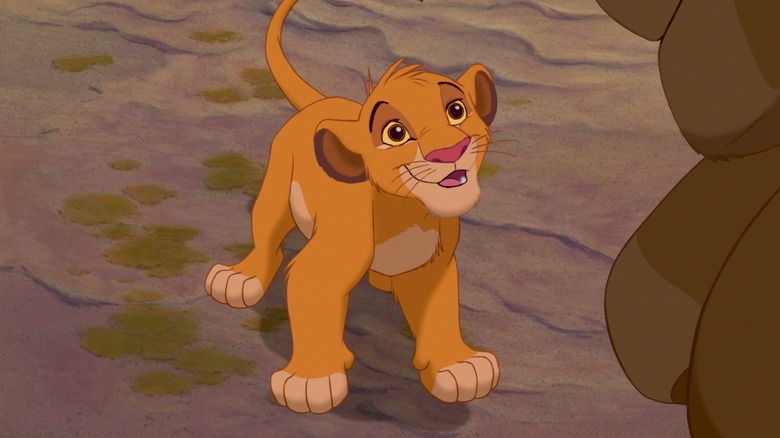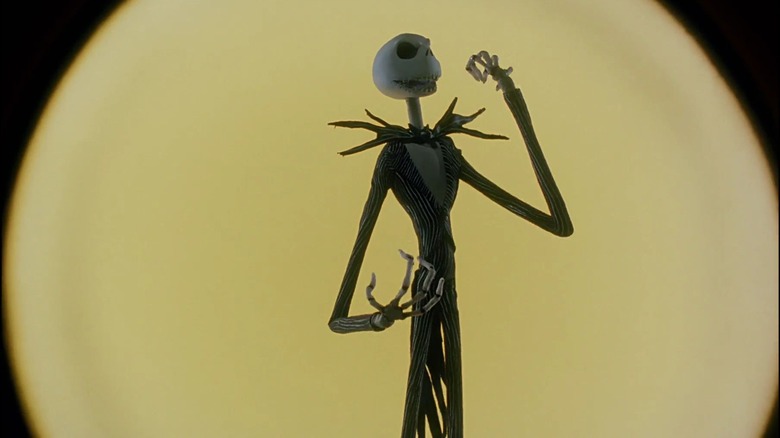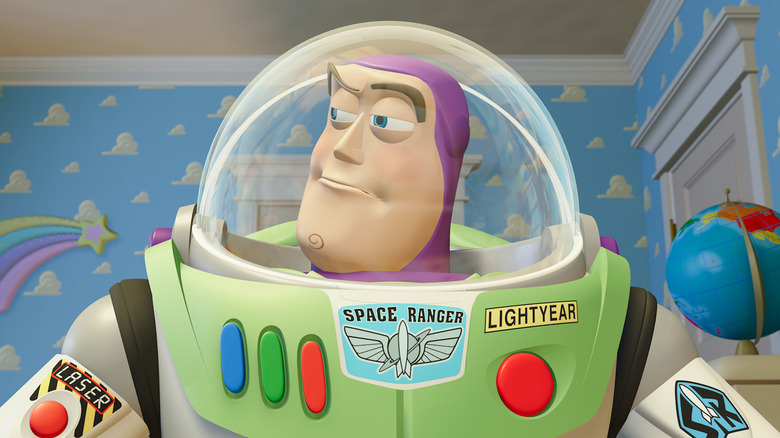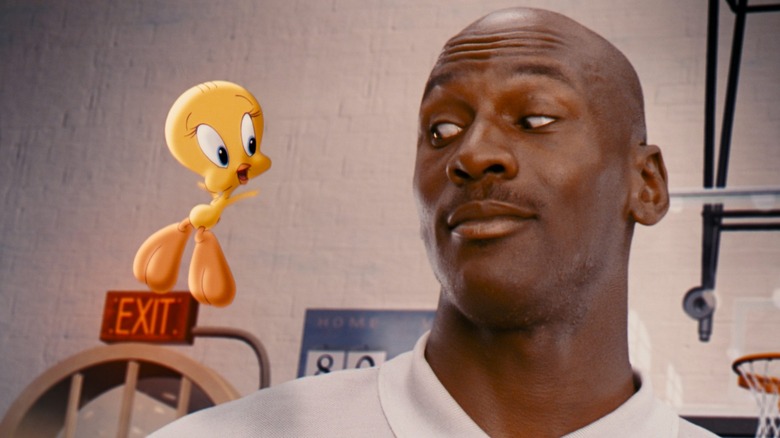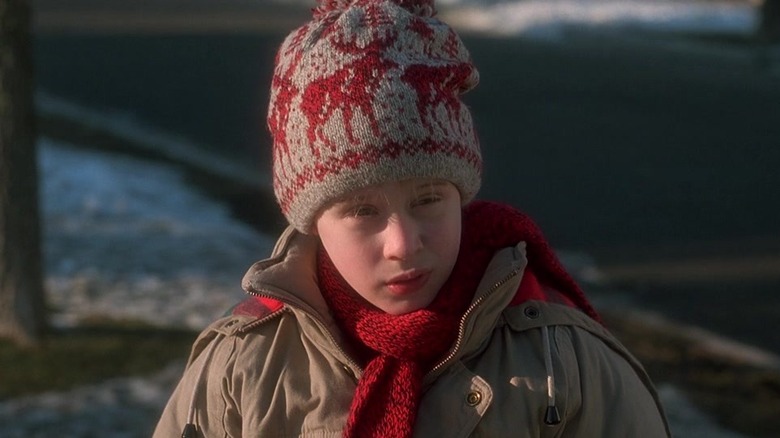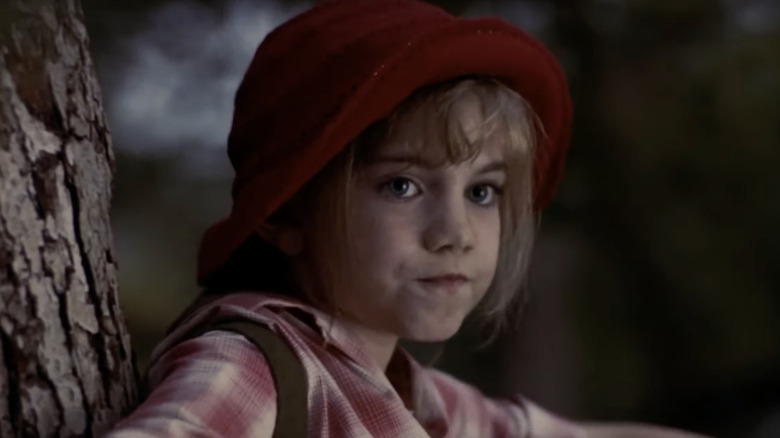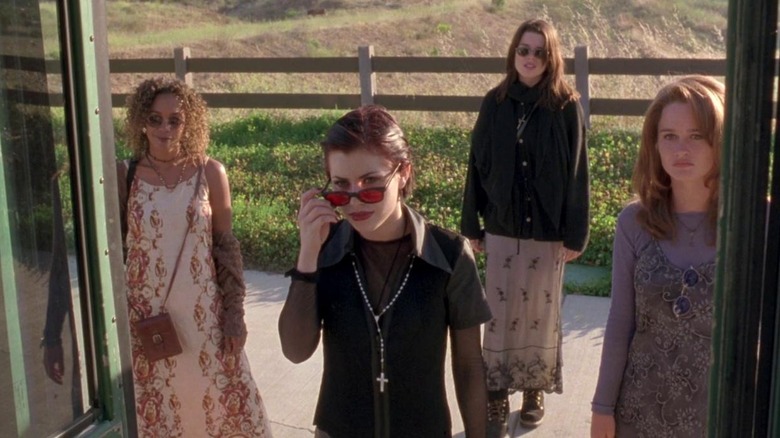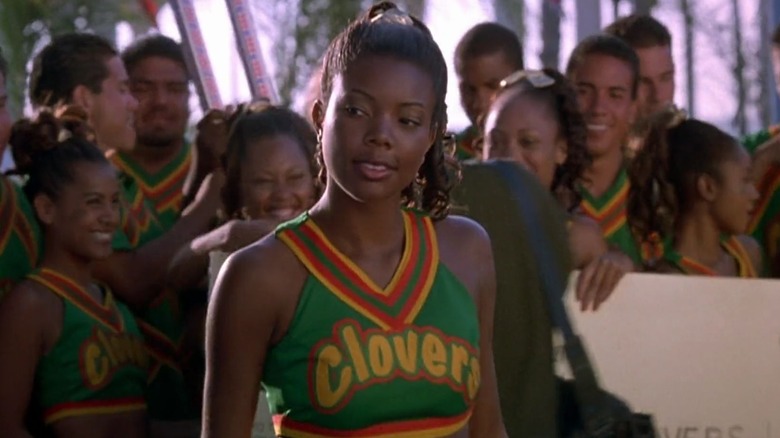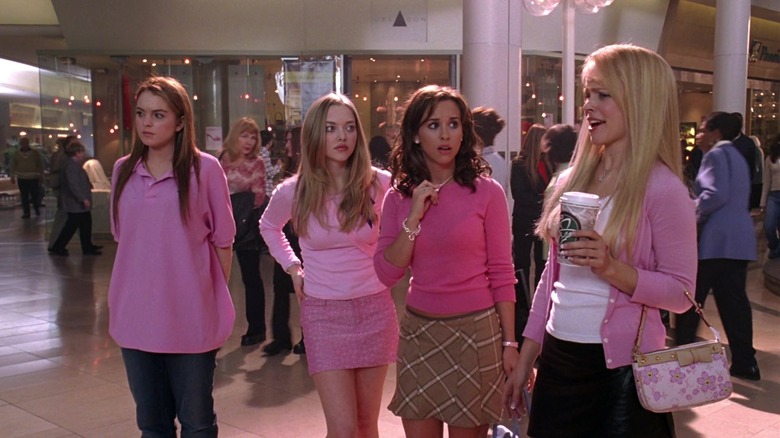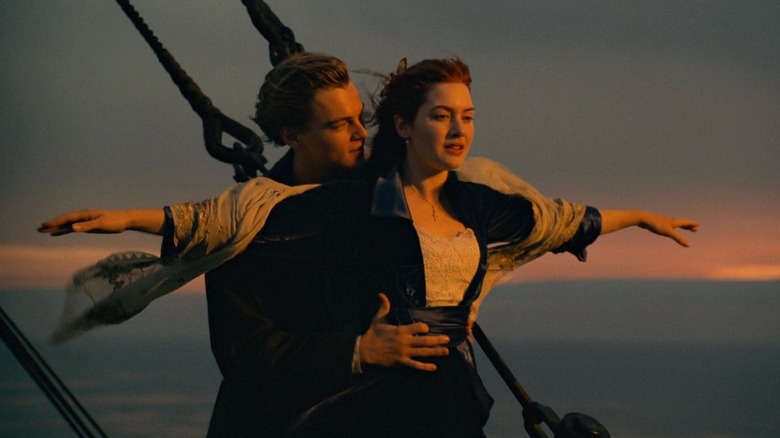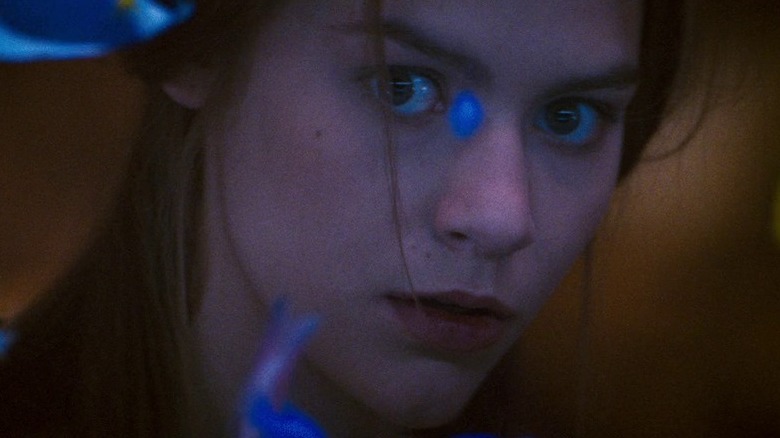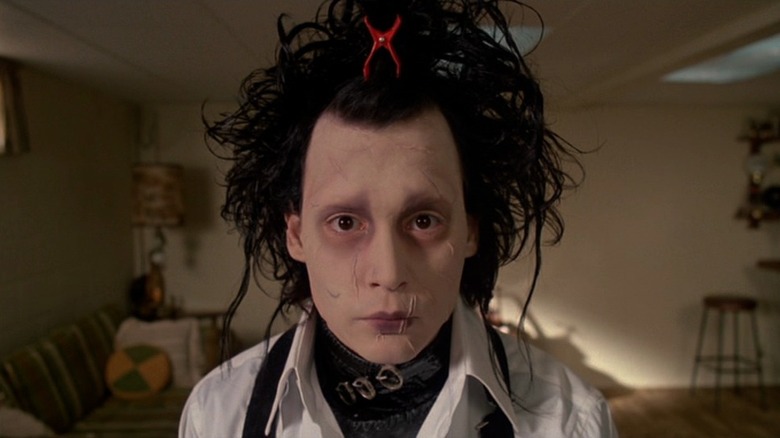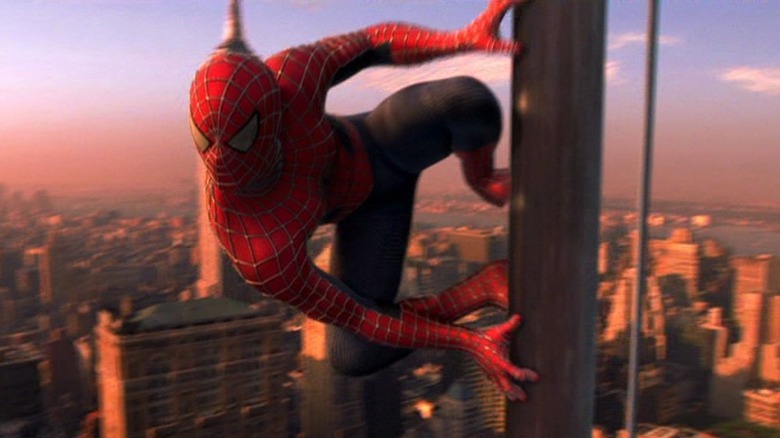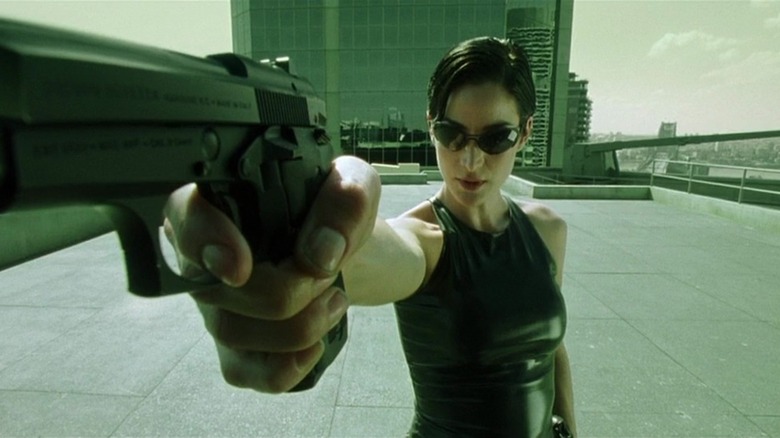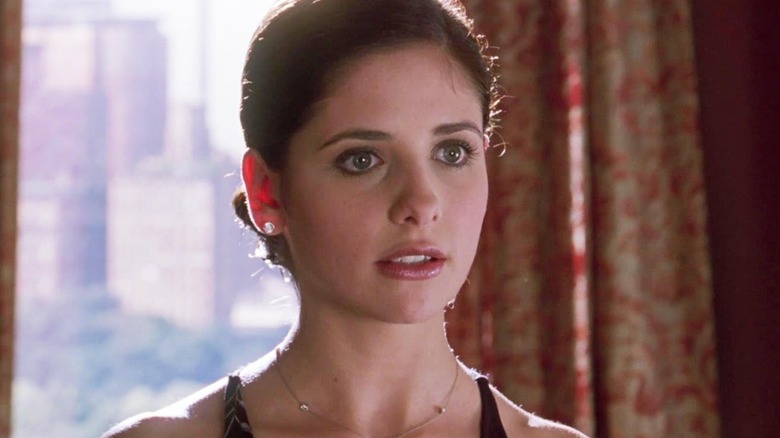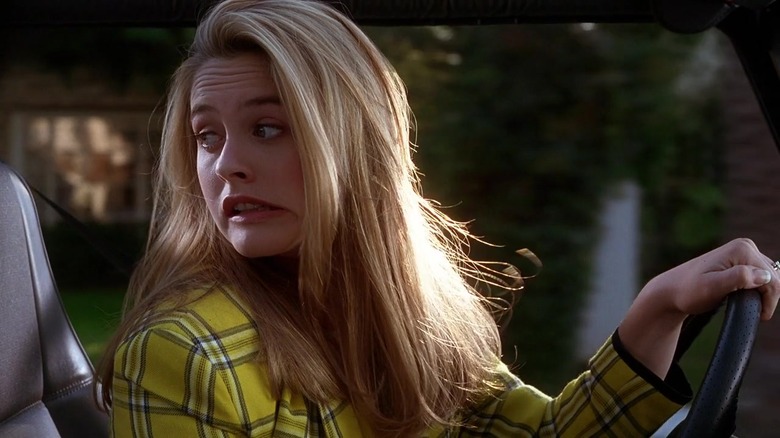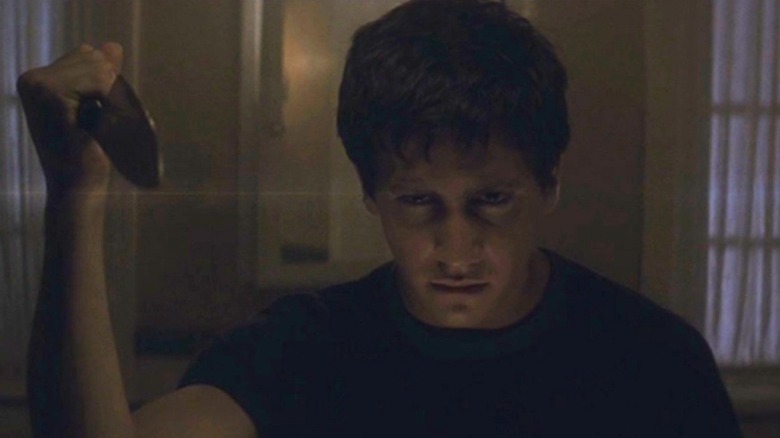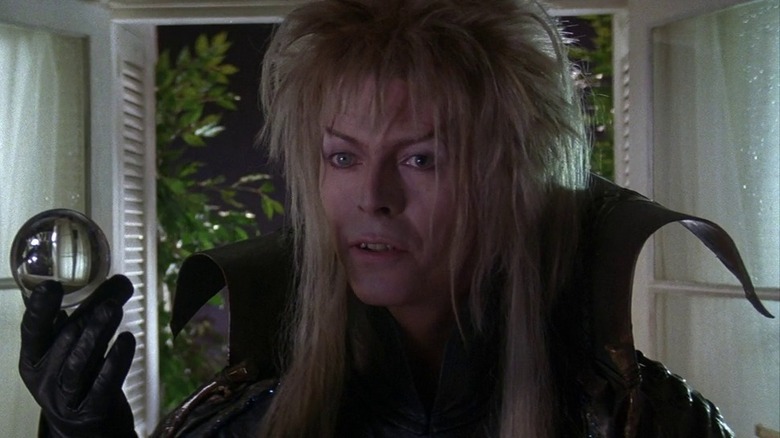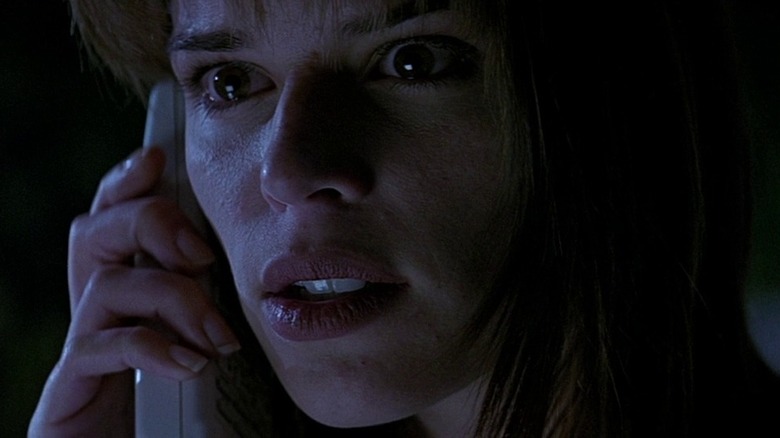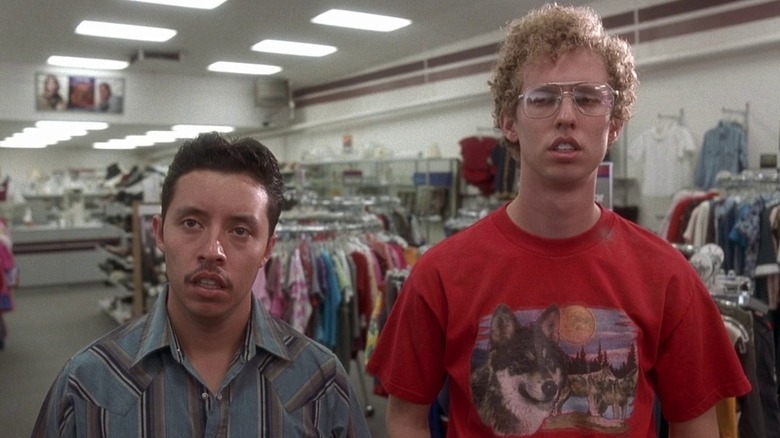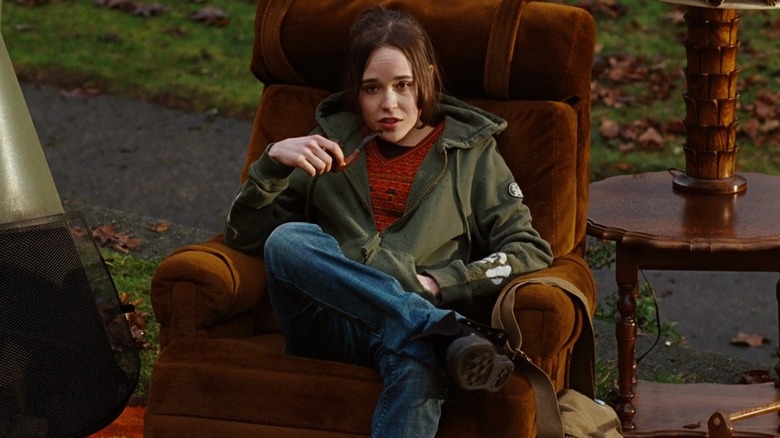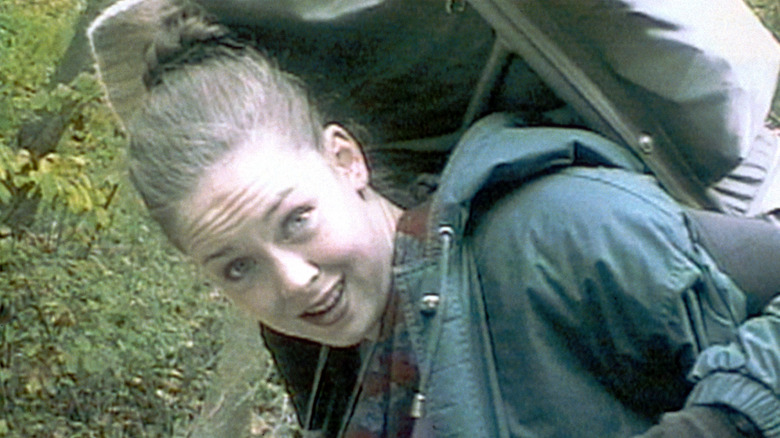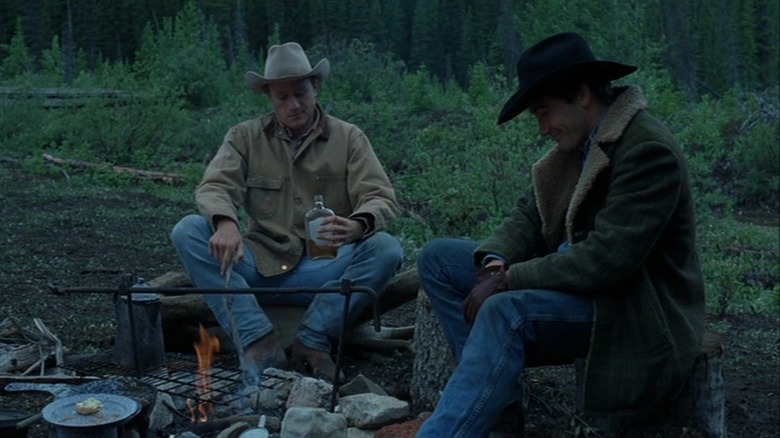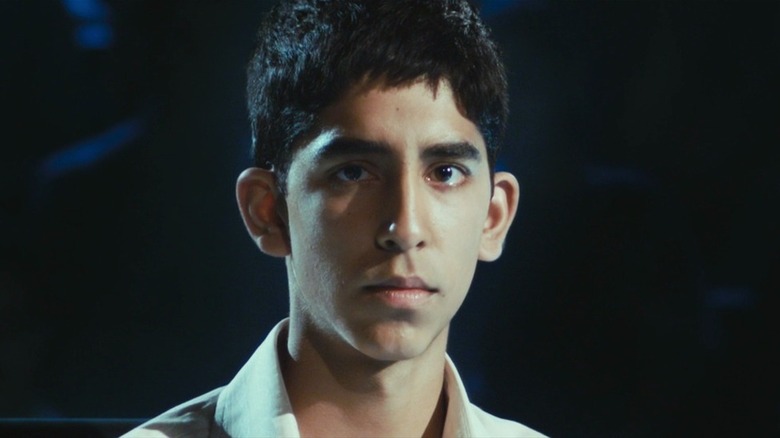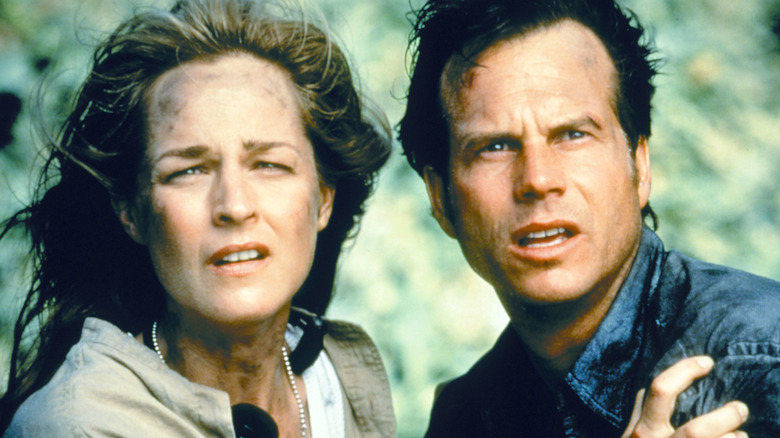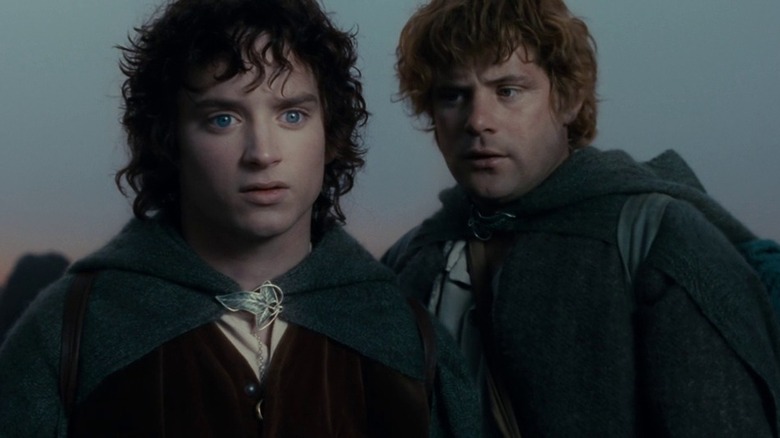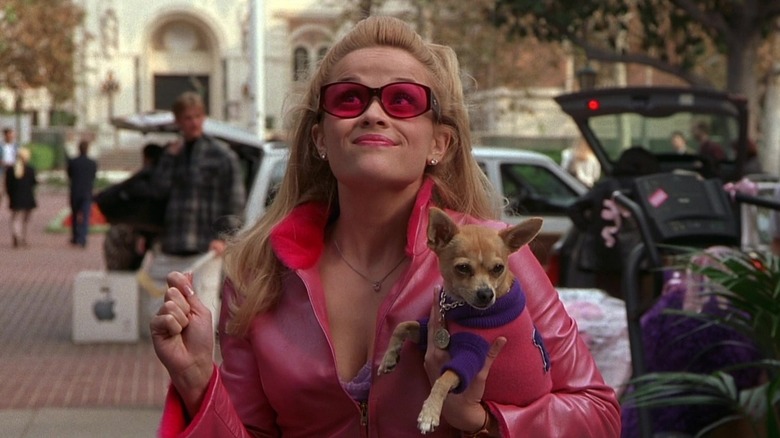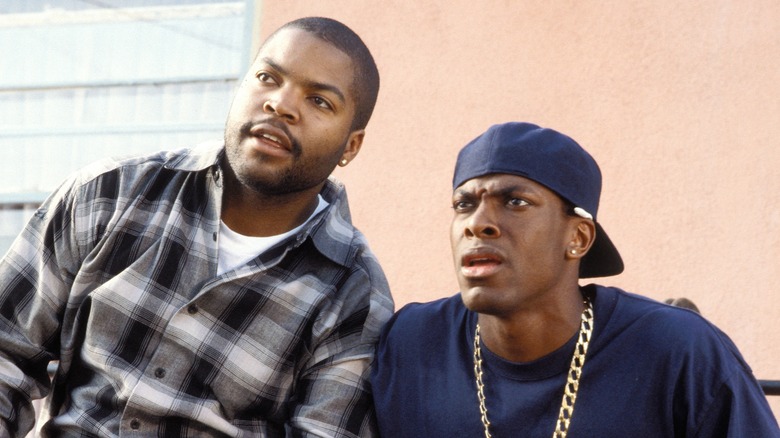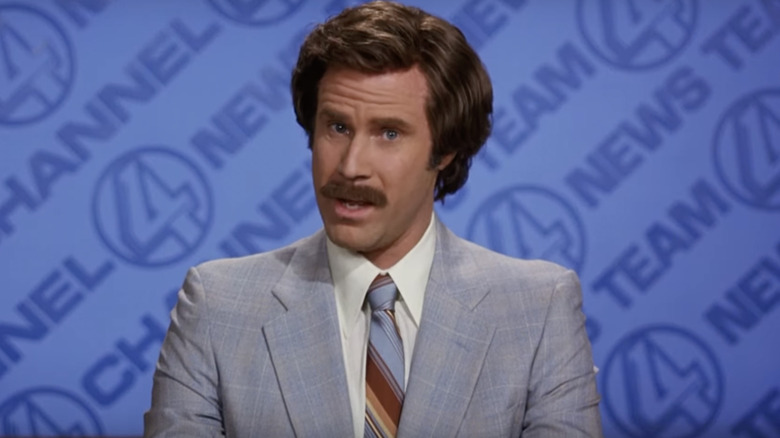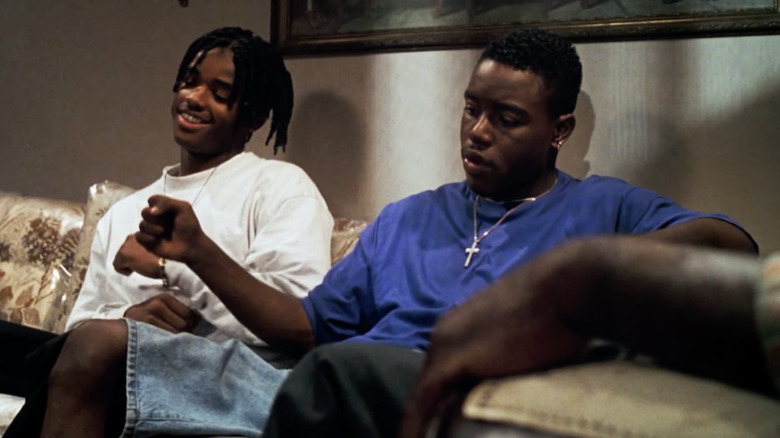30 Movies That Shaped The Millennial Generation
Ignore all the jokes about millennials and their avocado toast. The generation born between the early '80s and the mid-'90s (via PEW Research) is as complicated as any other — and we see that complexity reflected in their pop culture landmarks. If you assemble a list of classic millennial movies, you'll see risk-taking independent films as well as huge Hollywood spectacles. There's darkness as well as optimism. Millennials got to witness the beginning of a much-needed boost in diversity in Hollywood, as well as the rise of ground-breaking technology and CGI, all of which helped tell new (and sometimes old) stories in new ways.
Some of the films on our list are classics already that have either mainstream acclaim or devoted cult followings, while others may never get — or necessarily deserve — that level of critical respect.
In the end, that acclaim or recognition doesn't matter quite so much because for many, these movies feel immortal. And for many, what really matters are the memories of growing up with them, seeing them in theaters, and watching them over and over again on VHS tapes or DVDs. Let's take a look at the formative movies that make up a kind of common language for millennials.
The Lion King
"The Lion King" debuted at the height of the Disney Renaissance, when films like "The Little Mermaid" and "Aladdin" were restoring the company's slightly tarnished animation prestige by elevating it to new heights (via BFI). For many, "The Lion King" is one of the best movies from that period, and it was a formative childhood influence for millennials — who went on to be a prime audience for their beloved movie's spin-offs, sequels, and adaptations, from the awe-inspiring Broadway musical to the controversial CGI remake in 2019. "The Lion King" nostalgia continues to be a powerful force.
The original film is a masterpiece with rich animation, iconic visuals, and terrific songs. It nails all the Disney tropes, from "ridiculously entertaining villain who gets one of the best songs" to "sweet romance" to "heartbreaking loss that leaves the audience in tears."
Simba (Jonathan Taylor Thomas and Matthew Broderick) is a young lion who's supposed to inherit the throne from his father, King Mufasa (James Earl Jones). Simba's evil (but fabulous) uncle Scar (Jeremy Irons) wants to rule the kingdom himself, so he kills Mufasa and convinces Simba that Mufasa's death was his fault. A guilt-ridden Simba flees from home, until he decides to confront Scar and return the kingdom to its former peace.
While an adult perspective on "The Lion King" can reveal some of the film's faults — including the fact that this film set in Africa is dominated by white voices — it can also deepen your appreciation for subtle jokes, Shakespearean parallels, and mature implications. Millennial parents are now creating a whole new generation of fans by passing their "Lion King" love on to their own kids.
The Nightmare Before Christmas
Tim Burton's sensibility resonates with many millennials, who have responded to his heartfelt love of weird outsiders, kitsch, and darkly beautiful fantasy worlds. Burton's outlook is on display in all his films, but "The Nightmare Before Christmas" holds a special place in many millennials' hearts since this 1993 gem let this generation get the Burton experience early on.
With its charmingly funky stop-motion animation, iconic Danny Elfman score, and deeply original fantasy elements, "The Nightmare Before Christmas" more than earns its accolades. Besides, how often do you get a movie that plays just as well on Christmas as on Halloween?
The movie takes us inside a world where every holiday is managed by its own pocket dimension. Jack Skellington (Chris Sarandon) is the "Pumpkin King" of the endearingly and disturbingly spooky Halloween Town, and for years, he and the resident werewolves, monsters, and zombies have kept Halloween as eerie as anyone could want. Unbeknownst to almost everyone, though, Jack has been craving some variety — and when he winds up finding the portal to Christmas Town, he decides that he will be the new "Sandy Claws." He means well ... but that doesn't mean this switch will go smoothly.
It's almost impossible to beat the amount of sheer imagination and conviction in every frame of "The Nightmare Before Christmas." Roger Ebert nailed it when he said, "It has the kind of offbeat, subversive energy that tells [older kids] wonderful things are likely to happen. ... I found the movie a feast for the eyes and the imagination."
Toy Story
Pixar's first feature film, "Toy Story," changed the animation game for good in 1995. It was the first movie to use computer animation start to finish, which made it look dramatically different from everything that had come before it (via Pixar). It revealed a whole new world of technical and artistic possibilities.
As incredible and innovative as the film's animation approach is, it isn't the only way "Toy Story" shakes things up. Tom Kemper's "Toy Story: A Critical Reading" explores how "Toy Story" was so different from what audiences expected with animation: It was a modern movie with current references and humor, which was different from the Disney movies that had long pulled from fairytales, folktales, and earlier source material (via Cartoon Brew).
For Millennial viewers at the time, "Toy Story" didn't just offer a new style: It offered a new sensibility. It felt fresh and mature. Every generation wants to seize on what's next, and "Toy Story" and Pixar were it.
Of course, it doesn't hurt that the movie also features a heartfelt and irresistibly imaginative story about living toys, complete with a believably thorny rivalry between old-school cowboy doll Woody (Tom Hanks) and brand new astronaut toy Buzz Lightyear (Tim Allen), who are each vying to be the favorite toy of their owner Andy (John Morris). At the end of the day, "Toy Story" isn't just an influential movie; it's a beloved classic.
Space Jam
Is "Space Jam" a good movie? Maybe not. With a low-to-middling critical score on Rotten Tomatoes and only so-so ratings from audiences, it's hard for us to argue that this is an underrated gem. That doesn't change our enormous affection for it — and we're not the only ones who have a soft spot for this goofy story of Michael Jordan teaming up with Bugs Bunny and the Looney Toons to play basketball against some sneakily powered-up aliens, who want to capture the Looney Toons and use them as theme park attractions.
If you grew up in the '90s or the early '00s, the odds are good that "Space Jam" was a major part of your childhood. Some of these gags are probably permanently etched into your brain.
Crucially, "Space Jam" has a big heart and a playful spirit. For sheer humor, kids might be enraptured by the toons, but adults will probably gravitate towards the laconic Bill Murray playing himself. It captures some of that anarchic "Looney Tunes" energy, successfully combines it with an actual plot, anchors it with Michael Jordan's star power, and adds in plenty of cameos as seasoning. Plus, now we know why Michael Jordan went back to playing basketball! The Looney Toons revived his love of the game!
The Huffington Post may be right when it calls the movie a "cynical and highly successful marketing ploy" that we only continue to like because of nostalgia ... but we're okay with that. It works, and we have the rose-colored glasses to prove it.
Home Alone
"Home Alone" is a childhood classic for millennials, which was scripted by screen legend John Hughes and directed by family film favorite Chris Columbus.
While Generation X can lay claim to most of John Hughes' high school movies, this one came along a little later and took aim at a younger audience. Its 1990 release and subsequent home video presence made it a favorite with wide-eyed Millennial kids, who responded to both the fantasy and the fear of being left alone for the holidays. No nagging parents? The freedom to eat unlimited pizza — your choice of toppings! — and ice cream? Sitting down with a movie your parents thought you were too old for? These things are bliss, but inevitably the loneliness slowly starts to eat at the accidentally abandoned Kevin McCallister (Macaulay Culkin).
The movie lets that pathos resonate in just the right moments, but it spaces it out between scenes of madcap and sometimes terrifying slapstick. Two robbers (Joe Pesci and Daniel Stern) are determined to loot the McCallister house. Kevin, who has a terrifying degree of ingenuity and mechanical genius for an 8-year-old, is just as determined to stop them.
It's a funny, well-crafted crowd-pleaser that really holds up, and internet-savvy Millennials can now get an additional kick out of the viral online theory that Kevin grew up to be the Jigsaw Killer from "Saw."
My Girl
"My Girl" is one of those formative weepies: a tender, bittersweet, funny coming-of-age story that had the side effect of making an entire generation afraid of bees.
The movie tells the story of 11-year-old Vada (Anna Chlumsky) and Thomas J. (Macaulay Culkin). Thomas J. is sweet and earnest; Vada, whose father is the local mortician, is gloomier and more difficult. The two have a close friendship — one that eventually blossoms into a touching first kiss — and "My Girl" lets us soak up their time together and get to know them. Primarily, though, it's focused on Vada, who has a rocky year that starts the painful process of growing up ... and confronts her with a devastating loss.
While some critics like Owen Gleiberman dismissed the film as too sugary and formulaic, "My Girl" fans get to point to Roger Ebert himself as one of the movie's defenders. Ebert championed the film's sincerity, truth, and emotion, as he wrote, "The beauty in this film is in its directness. ... This is a movie that has its heart in the right place." If it also ripped your heart to shreds when you were growing up, you're in good company.
The Craft
If you want '90s girl power with some delicious horror edge, look no further than "The Craft," which has endeared itself to outcasts everywhere.
New girl Sarah (Robin Tunney) joins the tight-knit circle of her school's coven and resident outsiders: Bonnie (Neve Campbell), Rochelle (Rachel True), and Nancy (Fairuza Balk). With Sarah's magical powers added to the mix, the girls go from mystic dabbling to outright witchcraft, which feels like the only way to level the unfair playing fields they face at school and at home. It doesn't take long for things to spiral out of control, however, as their newly unleashed powers begin to corrupt them.
"The Craft" isn't perfect, and we — like a lot of viewers — rate the first half a lot higher than the second: It's way more entertaining to watch the girls embrace the craft than it is to watch them (predictably) pay for it. Stephen Holden's review for The New York Times nailed the squandered potential here, noting that the movie's empowering message about girl power and independence turns into "a heavy-handed sermon about karma and the awful things that can happen to bad girls who dare to vent their evil thoughts."
Even if the film punishes its leads too harshly, however, it still sells the power fantasy well enough to leave a mark on its fans, which has made it an empowering cult classic for many millennial women like Debanjali Rose of Insider and LGBTQ+ viewers (via The North Texas Daily).
Bring It On
"Bring It On" may look like a straightforward cheerleader comedy but its sharp humor, empathy, and investment in social issues make it ahead of its time.
Torrance (Kirsten Dunst) has just become captain of her San Diego school's Nationals-winning cheerleading squad the Toros, but discovers that the previous captain stole the winning routines from the Clovers, a Black and Latinx squad in Compton. So, Torrance enlists the help of new recruit Missy (Eliza Dushku) to create an original routine and beat the Clovers at Nationals fair and square.
Co-star Jesse Bradford points out to i-D that "Bring It On" seamlessly combines cheerleading with complex issues of cultural appropriation. By building the plot around the plausible revelation of the Toros stealing the Clovers' routines, the movie doesn't cordon off its social criticism to a few lectures: It dramatizes them into an awesome story that sucks audiences in. It prompts viewers to think about some genuinely uncomfortable questions. What do you do when you find out the prestigious position you've inherited is built on theft and exploitation?
Of course, the movie also has a strong cast, terrific cheerleading stunts, and good jokes. It wouldn't have lasted so long if it weren't fun and full of satisfying storytelling. "Bring It On" flies onto our list because it still has social relevance more than 20 years later — and it got millennials thinking and talking about concepts that didn't become mainstream until well after the Toros' and Clovers' pom-poms started gathering dust.
Mean Girls
"Mean Girls" is a tart, hilarious, and good-hearted look at the harsh social environment of a suburban high school. Naïve, homeschooled Cady (Lindsay Lohan) is bewildered by the Plastics, a clique of mean girls led by the school's Queen Bee, Regina George (Rachel McAdams). When she tries to take Regina down, however, Cady winds up getting sucked into the Plastics' vapid selfishness. She hasn't toppled Regina; she's just lost herself and the friends who really cared about her — and she has to do something to fix it.
If you want to determine a movie's generational pop culture impact by how often people quote it, "Mean Girls" has an extremely good shot at the crown for millennials. The Guardian named it as one of the most quotable movies of all time, while MTV and USA Today have ranked the movie's best quotes.
"Stop trying to make 'fetch' happen," "Raise your hand if you've ever been personally victimized by," "Get in loser, we're going shopping" ... and the list goes on. Let's just say that if you don't hear these "Mean Girls" lines — and others — on a regular basis, we hang out in very different social circles. You can't sit with us!
More than that, though, "Mean Girls" also nails a particular kind of millennial optimism. Sure, Regina George is a mean girl — but at the end of the day, no one really needs to destroy her. Her villainy isn't vanquished by the speeding bus so much as by taking up lacrosse and giving her aggression a healthier outlet.
Titanic
Each generation needs its own lushly romantic melodrama with heartthrob actors, soaring music, unforgettable spectacle, and tons of earnest emotion and for millennials, it's no other than James Cameron's "Titanic." This 1997 film focuses on a swoon-worthy cross-class love story between Rose (Kate Winslet) and Jack (Leonardo DiCaprio), two passengers on the doomed Titanic. They're meant for each other — but Jack is a broke, struggling artist, and Rose is from an upper-crust family. She's supposed to marry for money, not love.
Cameron gets his audience swept up in Rose and Jack's bittersweet romance, and it's so compelling that you can almost forget that there's a clock ticking in the background. Sooner or later, the Titanic is going to collide with that iceberg, and the emergency and desperate quest for survival will take over. The movie is equally vivid and riveting when it comes to the tension and tragedy of the disaster.
It's easy to crack jokes about "Titanic," but even if you think the movie doesn't hold up to critical inspection, you can't deny the seismic impact it had on viewers, who were just the right age at the time. Empire concluded that a few years down the line from "Titanic's" release, if "you ask the generation then producing, directing or hacking out reviews what turned them on to movies in the first place, more than a few will answer 'Titanic.'"
Romeo + Juliet
Even the best material can be butchered, so Shakespearean adaptations can be hit or miss. Every now and then, though, you get a Shakespeare movie that's not only well-executed but also genuinely transformative. It brings familiar material to life in new ways and sparks a whole generation's interest in the original plays.
For millennials, Baz Luhrmann's frenzied, imaginative, and gloriously gaudy 1996 adaptation "Romeo + Juliet" made Shakespeare cool in a whole new way. Luhrmann's distinctive and even overpowering visual style turns out to be a perfect match for the story's passion. He creates a heightened, hyperreal world where it feels like the colors are brighter, the feelings are purer, and the parties are better. It's both a bizarre and uncannily good representation of a certain kind of teenage intensity.
Teenagers Romeo (Leonardo DiCaprio) and Juliet (Claire Danes) come from wealthy families, who loathe each other and have fought for years. But when the two meet by chance, they fall in love at first sight. This is as much a tragedy as a romance, though, and Romeo and Juliet's plan to secretly marry is upset by complications, misunderstandings, and violence.
While the setting and archetypes here are all modernized with ingenuity and playfulness, it's the unfiltered mid-'90s style that makes this movie immortal. It's the kind of movie this contemporary Romeo and Juliet might make themselves, after growing up on a diet of cutting edge music videos. Luhrmann takes their taste as seriously as he takes their love, and it's magnificent to watch him give both their due.
Edward Scissorhands
"Edward Scissorhands" captures a sea change in American culture. Because it's a Tim Burton film — and for some, it's the Tim Burton film — this allegory features a pastel and hidebound suburbia and a lonely new arrival with scissor-blades for fingers, and those frills are a wonderful bonus. When Burton is working at the top of his form as he is here, he's a master of creating artificial and exaggerated worlds and characters that somehow speak to something real and true inside us all.
The movie packs a political punch specific to its time and place, but it also appeals to its viewers on a more personal level. With "Edward Scissorhands," we can, of course, identify with Edward (Johnny Depp) — the shunned and stigmatized outsider whose unavoidable weirdness is either gawked at or mocked. But even more than that, we can identify with Kim (Winona Ryder), who falls in love with him. The love story between Kim and Edward is touching, and it's also the perfect metaphor for being drawn to the unconventional and the uncomfortable.
For millennial teens working out their tastes, obsessions, and passions in a judgmental environment — i.e. in any high school anywhere — it meant a lot to see Kim choosing Edward and loving him all her life. It not only promised audiences that they didn't have to be "normal," but it also promised them that they could grow up without becoming a kind of pod person embracing a bland, lifeless world they didn't want.
Spider-Man
Sam Raimi's original "Spider-Man" is a gem from before the days of the superhero boom. It captures Peter Parker's down-to-earth appeal with warmth, sincerity, and humor. It has a strong story, exciting action, and one of our all-time favorite on-screen kisses. Best of all, it has a pitch-perfect cast.
"Spider-Man" tells the origins of Peter Parker's (Toby Maguire) superhero powers. After getting bitten by a super-spider, Peter discovers he has a whole new set of abilities like being able to climb up buildings and shoot spiderwebs out of his hands. While he initially uses his powers for fun, he soon realizes he has to use them to protect people from the dangerous greed of the Green Goblin (Willem Dafoe).
The movie benefits from having plenty of room to breathe. It is a little looser than today's studio-managed movies that have to all fit in with each other; as much as we love our cinematic universes, it's nice that Raimi doesn't need to pin down all the story's edges here. Plus, this "Spider-Man" didn't come with a lot of preexisting superhero movies it needed to top: It could afford to keep its concerns small-scale and relatable.
Leah Greenblatt singled out that quality in a 2022 retrospective for Entertainment Weekly, saying that the hand-to-hand combat of Spiderman and the Green Goblin's fight is an example of the "intimacy to that which the later movies [miss] in the noisy void of all those wide-screen CG battlefields."
The Matrix
For millennials, "The Matrix" will always exemplify a particular brand of cool. This 1999 movie hit at exactly the right time to inspire a generation-wide obsession with leather dusters, stylized action scenes, slow-mo bullet-dodging, tinted visuals, hackers, and mysteries and mythos. The film tossed out some of the distinctions between science fiction and fantasy to create a deep, intriguing universe that audiences found intoxicating and for some, the world of "The Matrix" is just one of many reasons that make it the best sci-fi movie ever.
As TV Guide noted, the film's plot works on various levels, as its blending of sci-fi and thriller genres, combined with its incredible action scenes, all work to create "a pretty compelling call to the dead-above-the-eyeballs masses to unite and cast off their chains." It's a sleek shock to the system.
Keanu Reeves stars as Neo, a disaffected hacker, who learns that his reality is actually the computer-generated "Matrix," a simulation managed by machines who now use dreaming humans as living batteries. There's a chance that Neo is the prophesied "One," who can overcome the machines and save humanity. But before he can even start discovering his destiny, he has to learn the ropes from allies like Trinity (Carrie-Ann Moss) and Morpheus (Laurence Fishburne) and avoid killers like the sinister Agent Smith (Hugo Weaving).
"The Matrix" is a pop culture landmark, with quotes and references that — for better and for worse — have become common parlance. Its success also marked the rising fortunes of its directors, the siblings Lana and Lilly Wachowski, who remain a great source for ambitious, genre-defying films that aren't afraid to go big or go home.
Cruel Intentions
If you grew up during the '90s, there's a good chance that "Cruel Intentions" was your first really scandalous movie, the one you didn't want your parents to know about ... and there's always something delicious (and memorable) about breaking that taboo. Even if "Cruel Intentions" has its faults, it's backed by solid and dark source material: Pierre Choderlos de Laclos' classic French novel "Les Liaisons dangereuses" or "Dangerous Liaisons."
"Cruel Intentions" even adds the extra-scandalous twist of setting its action in a prep school. It's one thing to watch two cruel aristocrats plot to ruin people's lives via flirtation and corruption, but it's a little more twisted to watch it play out with high school students.
Eternally bored playboy Sebastian (Ryan Phillippe) makes a bet with his power-hungry stepsister Catherine (Sarah Michelle Gellar) that he can seduce Anette (Reese Witherspoon), who has sworn to stay a virgin until marriage. As Sebastian discovers some surprises in Anette — and himself — Catherine does all that she can to keep him close to her.
"Cruel Intentions" commits to its sleaze and shock, brought to you by its bevy of '90s teen heartthrobs that also includes Joshua Jackson and Selma Blair. Salon's Charles Taylor noted how raunchy the film was at the time and "an honestly corrupt entertaining picture is never anything to sneeze at." If it left you with wide eyes and some guilty enjoyment back in 1999, it did the job it set out to do.
Clueless
Would we leave "Clueless" off this list? Ugh, as if! Writer-director Amy Heckerling's modernized but faithful 1995 "Emma" adaptation keeps all of Jane Austen's wit, social satire, and subtle romance, while also offering a loving and pitch-perfect portrait of wealthy and oblivious Bel Air teens in the '90s.
Cher Horowitz (Alicia Silverstone) is living her best life: She's wealthy, effortlessly popular, and genuinely outgoing. She even has a computer to help her plan the perfect outfit. All she wants — besides a driver's license — is the amusement and satisfaction of a little good-hearted social meddling. After all, she did some matchmaking with the school's two loneliest teachers, and that worked out, so she clearly has a gift.
She's exactly the right person to elevate new student Tai (Brittany Murphy) to her inner circle and get her to abandon her tragic stoner aesthetic and the boy that comes with it. Never mind what Cher's former stepbrother Josh (Paul Rudd) thinks. Cher will find the right guy for Tai and the right guy for her. She's got this ... except she doesn't.
"Clueless" is a pleasure to watch, and as Roger Ebert pointed out, you don't even have to be in the movie's target audience to enjoy it: "It will appeal to anyone who has a sense of humor and an ear for the ironic. Heckerling walks a fine line between satire and put-on, but she finds it, and her dialogue could be anthologized."
Donnie Darko
A terrifying rabbit costume. The uniquely beautiful sound of the phrase "cellar door." Time travel, philosophy, and physics. All these ingredients go into Richard Kelly's masterful "Donnie Darko," a film that — decades after its release — still defies easy explanation. That's part of what makes it so great: The movie's depth, surrealism, exhilaration, horror, and satire can't be fully explained, just experienced.
Donnie Darko (Jake Gyllenhaal) sleepwalks outside one night and meets Frank, a man in a rabbit costume, who tells him the world is going to end in 28 days. Donnie wakes up to find that while he was sleepwalking, a jet engine crashed into his room. This initiates a series of strange events, as Donnie tries to figure out how he can stop the end of the world.
"Donnie Darko" has a special staying power in its fans' memories because depth and surrealism aren't qualities that usually turn up in supposed teen thrillers. When we see a "teen" film with a mature rating, we expect profanity, love scenes, and violence — all of which appear in "Donnie Darko" to some extent — but we don't usually think of this degree of twisty, experimental thoughtfulness.
Kids in 2001 may have tuned in looking for the next "American Pie," but instead they got a skull-faced rabbit warning a young Jake Gyllenhaal that the world is going to end. They got a tangled, sophisticated look at fate, generational divides, sacrifice, and the nature of time. That kind of thing leaves a mark, and it left a lot of young cinephiles hunting for more films that delivered this same kind of mysterious kick.
Labyrinth
Jim Henson's "Labyrinth" gives girls a dark and lushly romantic fantasy world where they can take center stage, so it's no surprise that this was a formative cinematic experience for young millennials.
The film follows 16-year-old Sarah (Jennifer Connelly), who makes an impulsive, ill-advised wish to be rid of her baby brother ... and then has to rescue him from the clutches of the compelling Goblin King (David Bowie). Sarah's journey takes her through a weird, fascinating, and often creepy landscape that includes everything from the titular labyrinth to the Bog of Eternal Stench to a panoply of puppet creatures, who act as both friend and foe. Sarah has to learn to get by in a complicated and murky world, one where resentment doesn't preclude love, friends can betray you, and seduction and danger can go hand-in-hand.
That learning curve means that for all the rich and evocative fantasy elements, this is, at its heart, about a girl growing up. All the outer wonders are matched by inner depths, especially when it comes to Sarah's coming-of-age and her complicated, charged relationship with the Goblin King. It's hard to think of any other film that creates such a successful and believable dreamscape. As Daily Dead wrote, "It is that unfettered creativity, along with the mixing of the dark and light, the whimsical with the sinister, that distinguishes 'Labyrinth' from other films of the 1980s."
Scream
The 1970s and '80s were the golden age for slasher movies, but eventually that tide of innovation, imitation, and experimentation started to ebb. The movies became predictable and tired, and genre-savvy audiences spent more time rolling their eyes than jumping from scares.
Then along came "Scream," directed by horror icon Wes Craven and scripted by "Dawson's Creek" creator Kevin Williamson, and suddenly, this 1996 film reinvented and reinvigorated a worn-out genre. A year after her mother's murder, Sidney Prescott (Neve Campbell) faces a new horror in the form of a masked killer, who is targeting her classmates and coming for her next.
"Scream" is a metafictional horror valentine that's both a wry satire of slasher conventions and a pitch-perfect (and genuinely scary) example of them. Its characters know all the rules of these movies, but so does the killer stalking and terrorizing them — and this ghost-masked figure is determined to use the slasher template to become a legend.
The film is peppered with horror in-jokes — like the eternal folly of doing the deed in a slasher movie — and its witty meta approach delighted millennials, who'd grown up poking fun at the genre. At the same time, the movie also gave audiences real chills, a compelling and twisty mystery, and a memorable heroine, who's not just trying to survive; she's trying to work through her trauma too (via Screen Queens).
As The Washington Post acknowledged, the film became "an instant classic, and not simply of the genre." Subsequent franchises went on to borrow the movie's snappy, self-referential style, but "Scream" still stands out as the one that started it all.
Napoleon Dynamite
"Napoleon Dynamite" is a slice-of-life story following its titlular character (Jon Heder), an Idaho teenager with an off-kilter approach to life, a bizarre family, and a commitment to getting his new transfer student best friend, Pedro (Efren Ramirez), elected class president against all odds.
Like a lot of cult movies, it's offbeat and not for everyone and it manages to be odd and out-of-step even for a cult movie. Even film critic Scott Tobias, who wrote a series on the New Cult Canon for The AV Club, was baffled by it: "It left me genuinely flummoxed, as if it were a dog whistle only some can hear." Some people don't get it while others continue to flock to the town it's set in (via The Salt Lake Tribune).
Part of the film's charm might be that it legitimately doesn't feel like anything else. It was made far outside Hollywood and shows almost no interest in more mainstream approaches to comedy, acting, or dialogue. It's structured like a high school movie, but it follows a hero whose "flirtation" consists of telling a girl, "You could be drinking whole [milk] if you wanted to." Napoleon is a constant fountain of comedic irritation, weird habits, and intense interests — and we're into it. The one thing you can say about Napoleon is that he is, as they say, living his truth.
Even if you don't like it, the movie's very divisiveness makes it an important film for millennials. It's one of this generation's major cult films that taught audiences how eccentric art can be and how far tastes can diverge.
Juno
Some movies are divisive, while others are crowd-pleasers, and the 2007 teen pregnancy comedy "Juno" is one of the rare movies that's somehow both. In particular, the film's distinctively quirky dialogue hits some viewers like nails on a chalkboard. This lead to "Juno" becoming the centerpiece in a larger debate about stylized vs. natural dialogue in the movies, as Jim Emerson outlined for RogerEbert.com. Even the movie's detractors, however, have to admit that "Juno" is iconic and that it helped push Elliot Page, Michael Cera, and screenwriter Diablo Cody towards stardom.
When 16-year-old Juno (Elliot Page) winds up unexpectedly pregnant, she thinks she has it all under control. She'll have the baby, and then it can go to eager would-be mother Vanessa (Jennifer Garner) and her husband Mark (Jason Bateman). But despite Juno's best efforts to act unfazed, she's still a kid in a tough situation — and this isn't necessarily going to go smoothly.
We're in the pro-"Juno" camp. It's witty, warm, and full of top-notch performances right down to supporting cast members like J.K. Simmons and Allison Janney as Juno's dad and stepmother. It doesn't shy away from difficult emotions like disappointment, ambivalence, and vulnerability, and it manages to tackle its material with an emotional honesty that lies just beneath its candy-coated outer shell.
Roger Ebert praised the film in part for uniting its audience in surprised appreciation: "It is so very rare to sit with an audience that leans forward with delight and is in step with every turn and surprise of an uncommonly intelligent screenplay." It's fantastic to see millennial audiences embracing something this unusual.
The Blair Witch Project
Heather, Josh, and Mike trek into the woods to film Heather's documentary on the local legend of the Blair Witch, a centuries-old supernatural figure, who supposedly committed and inspired multiple grisly murders. When it's time to head home, though, the trio can't seem to find their way out of the woods ... and they start to feel like they're not alone out there.
"The Blair Witch Project" helped shake up the horror landscape and define how millennials thought about the genre. According to USA Today, this 1999 found footage mockumentary was one of the first films to embrace the internet and use it to its advantage by stirring up word of mouth and blurring the line between fiction and reality. Even when you know it's not real, the film is still effective and wonderfully creepy. Multiply that terror by ten for the early wave of audiences who went in half-convinced this was about actual documentary filmmakers investigating real folklore.
"The Blair Witch Project" didn't invent the found footage format, but as Collider notes, its success popularized it and inspired plenty of follow-ups like "Paranormal Activity." Roger Ebert even listed it as one of the 10 most influential films of the 20th century — alongside "The Battleship Potemkin" and "Citizen Kane" — that transformed the expectations of how a film could be made and received.
Furthermore, the movie is a lot more than just its gimmick. This is a grueling horror masterpiece with a particularly chilling ending, and critical publications like The Hollywood Reporter continue to rank it high on all-time horror lists ... and we still don't want to watch it too late at night.
Brokeback Mountain
"Brokeback Mountain" is a painful but beautiful romantic drama. It shows all the unhappiness and tragedy caused by homophobia, but it also creates an intense and believable connection between its two leads, sheep-herders Jack (Jake Gyllenhaal) and Ennis (Heath Ledger). Their longing for each other is palpable, but it's the 1960s, and they live in rural Wyoming: Pursuing their feelings could get them killed. Trying to deny them, on the other hand, leaves them miserable.
As Far Out explains, "Brokeback Mountain" is "a moving and compelling poetic saga of desire and denial that ... [paved] the way for LGBTQ+ films to establish their legacy with pride." Even at the time, the film's undeniable quality had its own force: People could — and did — make bad jokes about the "gay cowboy movie," but the movie never treats its characters or its own ambitions as a joke.
It puts Jack and Ennis front and center and takes their love and heartbreak seriously. It gives this story all the hallmarks of a Hollywood prestige movie: big-name actors, finely calibrated performances, a well-known director, and the unmistakable sheen of a decent budget (via Box Office Mojo). Its massive success rang a welcome death knell for the era of gay characters confined solely to comedic stereotypes and saintly supporting roles. It proved that audiences would embrace LGBTQ+ characters as complex leads in their own right.
Slumdog Millionaire
This story of a boy's rise from the slums of Mumbai to quiz show success has, at its best, a beautiful kinetic energy and a fairy tale-like resonance. Dev Patel shines as Jamal, a romantic optimist, who has been subjected to a life full of tragedies and indignities — but who holds out hope that his success on India's version of "Who Wants to Be a Millionaire?" will give him the chance to reunite with his long-lost love Latika (Freida Pinto).
As its Rotten Tomatoes scores show, "Slumdog Millionaire" was a major critical success and it even picked up eight Academy Awards. For English-speaking audiences, it was a potential gateway into Bollywood cinema, especially given the prominent acting careers of the film's co-stars Irrfan Khan and Anil Kapoor. Its exultant final musical number, "Jai Ho," remains joyous and ridiculously catchy.
It's easy to see why a lot of millennials responded to the movie as both a well-constructed romantic melodrama and a doorway to global concerns and international settings that Hollywood rarely focuses on. However, IndiaFacts notes that the movie hasn't always been a hit with Indian audiences, with some critics arguing that the film features a troubling anti-Hindu subtext, a sanitized portrayal of Americans in India, and a sensationalized and voyeuristic approach to Mumbai poverty.
Whether or not "Slumdog Millionaire" holds up — or ever worked for you at all — it's still a landmark film that opened new doors in Bollywood (via The Guardian), pointed Hollywood toward new and diverse influences, and helped introduce younger audiences to the possibilities of world cinema.
Twister
1996 storm-chasing action movie "Twister" was a formative blockbuster for many millennials. Within a few years of its release, Hollywood ushered out a whole roster of big-budget disaster movies like "Volcano," "Dante's Peak," and "Armageddon," but "Twister" debuted just ahead of the pack and helped set the stage for a whole new era of gleeful on-screen destruction.
Anchorman Bill (Bill Paxton) and meteorologist Jo (Helen Hunt) have recently separated, but find themselves teaming up again to chase down massive tornados to test "Dorothy," a revolutionary device that could monitor the storms from the inside-out. With their rival Jonas (Cary Elwes) eager to usurp their success, the stakes are as high as the danger.
As Forbes notes, a creative team of entertainment hard-hitters like "Speed" director Jan de Bont and writer Michael Crichton combine with fresh, effects-driven spectacle to make "Twister" shine as "a definitive piece of mid-90's Hollywood blockbuster filmmaking ... [and] an automatic event movie."
Everything about "Twister" promised something exciting and current — and that's what it delivered. It's one of the world's great popcorn movies, and it worked to establish a template that became ubiquitous for several years to come. Even now, we still have a lot of affection for a good — or even a bad but cheesily fun — disaster movie, and we owe a lot of that love to "Twister."
The Lord of the Rings Trilogy
When hobbit Frodo (Elijah Wood) inherits his beloved uncle's magic ring, he also inherits an earth-shattering responsibility: The ring offers extraordinary power, and if it falls into the hands of the malevolent Sauron, it could spell the end of everything. Along with a band of warriors and companions, Frodo must embark on a dangerous journey to destroy the ring, which is already exerting a corrupting influence on everything around it.
"The Lord of the Rings" trilogy remade the entertainment landscape. It proved that high fantasy stories could work on the screen and it's hard to imagine shows like "Game of Thrones" or "The Wheel of Time" ever being green-lit without the spectacular success of Peter Jackson's original trilogy, which grossed nearly $3 billion in ticket sales alone (via The Numbers).
It showed off the potential to use the latest CGI techniques for storytelling as well as spectacle. It was such a sensation that New Zealand welcomed in a whole new wave of tourists, as wide-eyed fans headed off in droves to see the film's stunning Middle-Earth landscapes in person (via Variety).
The best part of the trilogy's legacy, however, is the mark it left on its loyal fans. The movies' sincerity, warmth, and original December release dates have made "Lord of the Rings" marathons a holiday tradition in many households (via GeekDad). These movies have a permanent place in our hearts, and whenever we're talking about genuine heroism, or amazing theater experiences, they're going to come up — and those memories are always going to make us smile.
Legally Blonde
Optimistic, cheerful, and not messing around: These words could describe both "Legally Blonde" and its star, Reese Witherspoon's effervescent Elle Woods.
On the night that Elle expects a proposal from her boyfriend Warren (Matthew Davis), she gets unceremoniously dumped instead. She's just too frivolous, fun, and, well, blonde to fit in with his planned future at Harvard Law. In an effort to win him back and convince him she can be the serious match he wants, she dedicates herself to getting into Harvard too — "What, like it's hard?" — but enrolling is only half the battle. "Legally Blonde" follows Elle's transformation as she buckles down, embraces her new ambition and passion, and proves that she can master the law without trading in her pink wardrobe and bubbly personality.
"Legally Blonde" is a delight through and through: smart, funny, and with an empowering message about staying true to who you are that influenced many millennials. In The Wall Street Journal, Witherspoon herself testified to her character's long-term cultural impact: "At least once a week I have a woman come up to me and say, 'I went to law school because of 'Legally Blonde.'" Given the film's emphasis on women supporting each other, "Legally Blonde" encouraging women everywhere to chase the high-powered career of their dreams is a fitting testament to the movie's spirit.
Friday
Ultimate Movie Year recounts Ice Cube's ambition to have the stoner comedy "Friday"— which he co-wrote and starred in — portray Black, working class South Central Los Angeles as a place where two ordinary guys like the newly unemployed Craig (Ice Cube) and his friend Smokey (Chris Tucker) could just hang out, chat, and smoke weed. Well, and scrounge around trying to find $200 to pay for the marijuana they smoked instead of selling, but that's more adventurous than gritty.
Many people had an image of South Central LA as hyper-violent and depressing and Ice Cube wanted to offer a different perspective with "Friday." Needless to say, he succeeded in his goal. "Friday" not only effectively challenges on-screen stereotypes, but it also shines as a laid-back, funny hangout film.
"Friday" has even achieved internet immortality, with one of its lines — "Bye, Felicia" — turning into a lasting meme that, as Ice Cube himself put it in during an appearance on "Conan," is the perfect thing "to get anyone out of your face."
Of course, the movie is a lot more than its most-quoted line. In fact, Angela Means, the actress that played Felicia, told Hype+ that she really wishes people would stop trying to dismiss Felicia and instead think about her — and her real-life counterparts — with more empathy. "Friday" is a sharp, funny, and unconventional film that acknowledges poverty, drugs, and fatalism with a daring shrug, having, as Entertainment Weekly says, "the nerve to suggest that the line between tragedy and comedy may be in the bloodshot eye of the beholder."
Anchorman
It's 1974, and the oblivious, self-satisfied Ron Burgundy (Will Ferrell) rules the San Francisco airwaves as the city's most beloved anchorman. He's on top of the world ... until the network hires the ambitious, coolly competent Veronica Corningstone (Christina Applegate) and makes her his co-anchor. Let's just say Ron doesn't enjoy sharing the limelight.
"Anchorman" is one of the cornerstone comedies for millennials. As The Huffington Post explains, the movie broke with 2004 comedy norms to use an ensemble cast and give them room to spark off each other to give rise to improv greatness.
The result is a movie that's sublime in its zaniness. The satire fires on all cylinders, the chemistry is off the charts, and the willingness to get weird — like letting the rivalry between different stations' news teams escalate into a no-holds-barred brawl featuring a trident and a grenade — leaves us astonished and amused. It almost goes without saying that it's filled with brilliant dialogue that's become part of our everyday conversational lexicon. We love it like Brick loves lamp.
The success of "Anchorman" meant that improvisation-driven comedies with laid-back rhythms, casual plotting, and sprawling casts full of cameos and beloved performers in bit parts — comedies that blend anarchic absurdity with the easy riffing of a good hangout film — soon became the status quo. "Anchorman" was followed by a whole spate of other Judd Apatow-produced movies — "The 40-Year-Old Virgin" and the great "Talladega Nights," for example — that helped set the mood for the era.
Menace II Society
"Menace II Society" deals unflinchingly with how the onslaught of drugs and violence, the weight of prejudice, and the constriction of limited options can all leave characters nihilistic enough to squander what few chances they're given. As Owen Gleiberman wrote in Entertainment Weekly, the film is "bleak, brilliant, unsparing." Crucially, however, while it's a movie that will leave you in shreds, it's far from a slog; in fact, it has energy and tension to spare.
Best friends Caine (Tyrin Turner) and O-Dog (Larenz Tate) are two restless, impulsive teenage boys bound for tragedy — sometimes of their own making. They're in a 1993 Los Angeles that seethes with racism, machismo, and bottled-up frustration, and their lives are about to explode. O-Dog, the more callous of the two, murders a liquor store owner and his wife and decides to embrace his new hardened identity and the trouble that comes with it. Caine tries, not always successfully, to extricate himself. Even when he seems to slip out of one trap, however, there's another one waiting.
While Rotten Tomatoes shows that "Menace II Society" received great critical acclaim, the best indication of the mark it left on millennials is probably the fact that it snagged the 1994 MTV Movie Award for Best Movie (via IMDb). It's not just a great and important film; it's one that its target audience could embrace as cool — which meant they could watch it over and over again and let its significance really sink in.
